
AI Tools for Green Entrepreneurs
AI is transforming the way small businesses and startups tackle sustainability challenges. From reducing emissions to optimizing supply chains, these tools are helping green entrepreneurs save costs, improve efficiency, and meet regulatory demands. Here’s a quick look at the top tools making an impact:
- JobLogr: Simplifies hiring for green-focused roles with AI-powered resume analysis and job matching. Affordable at $20/month.
- Google Cloud: Optimizes supply chains, reducing waste and emissions with real-time analytics and predictive modeling.
- Google DeepMind: Cuts energy use by up to 40% in data centers using AI-driven energy management.
- Honeywell: Automates compliance tracking and reduces energy use in facilities by up to 25%.
- Bosch: Improves manufacturing quality control, cutting material waste and energy consumption.
- BrainBox AI: Enhances HVAC efficiency, cutting energy costs by 25% and improving indoor air quality.
- PepsiCo Smart Agriculture: Uses AI to improve farming efficiency and reduce resource use.
- Amazon Web Services (AWS): Tracks emissions and energy usage, providing actionable sustainability insights.
- Mortar IO: Automates carbon footprint analysis and reporting, helping businesses meet regulatory standards.
These tools are helping businesses of all sizes align with stricter environmental regulations while staying competitive. Whether you’re managing supply chains, optimizing energy use, or tracking emissions, AI offers practical solutions to scale your green initiatives efficiently.
AI Agents for Sustainability | ESG | Carbon Footprint | Carbon Accounting
1. JobLogr
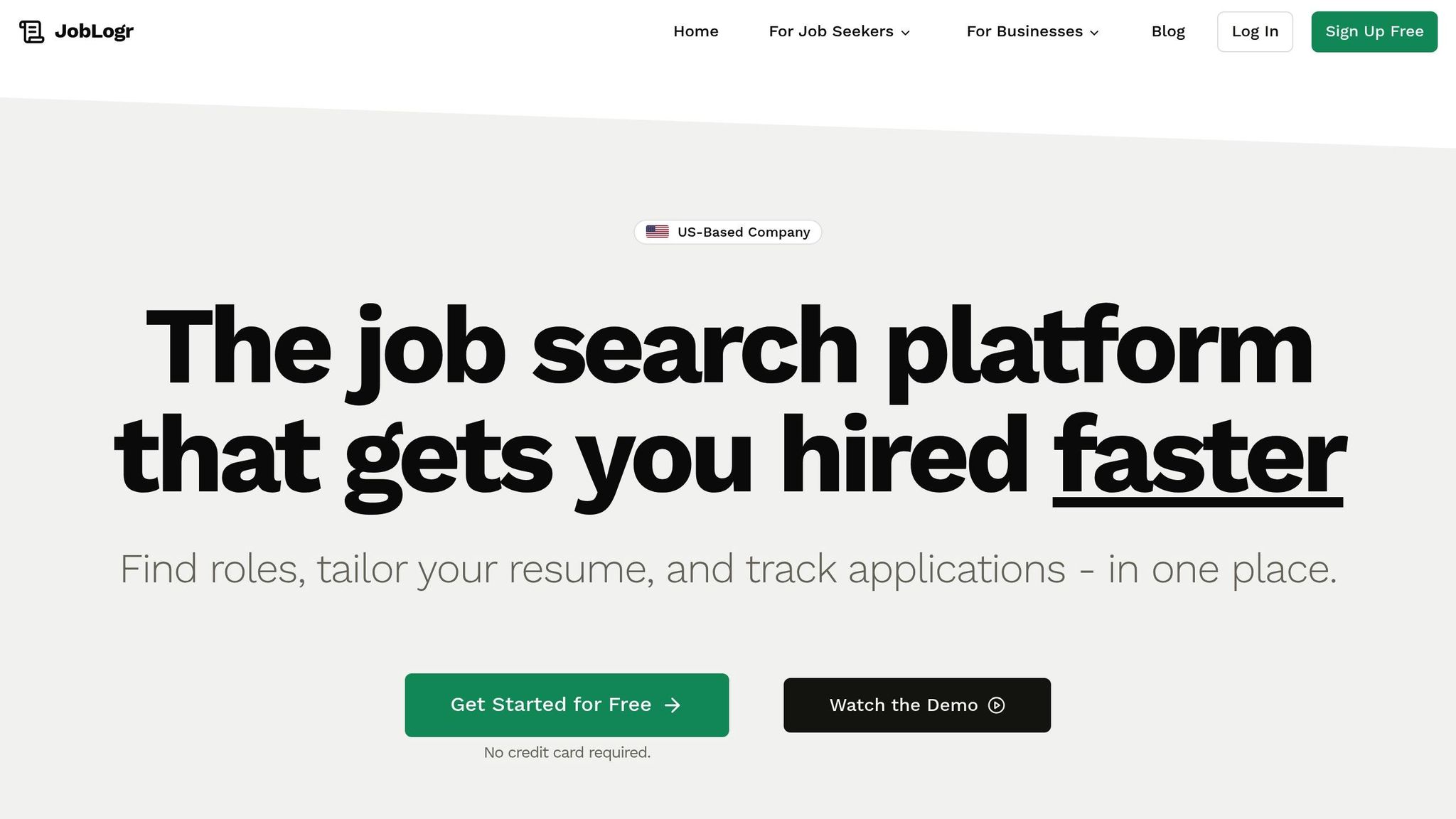
JobLogr is part of the growing wave of AI tools reshaping green industries, helping entrepreneurs focus on making an environmental impact rather than getting bogged down in recruitment. This tool simplifies hiring by automating job searches, analyzing resumes, and matching candidates to roles. It pulls data from over 100,000 company career pages and popular job boards like Indeed, LinkedIn, and Glassdoor, making it a go-to resource for sustainability-focused businesses.
Sustainability Impact
By streamlining the hiring process, JobLogr allows green entrepreneurs to save time and money, which can then be redirected toward their environmental goals. Its AI ensures that candidates with the right sustainability skills and experience are matched quickly, helping businesses build teams that align with their green mission.
Key Features for Green Innovation
JobLogr is designed with sustainability in mind. Its AI highlights candidates' skills and certifications in areas like renewable energy, environmental science, and green technology. It even generates automated cover letters to help job seekers express their passion for sustainability. For employers, the platform offers tailored interview preparation tools to evaluate a candidate's commitment to environmental objectives.
Practical Applications for US-based Green Entrepreneurs
For green entrepreneurs in the United States, JobLogr offers a practical solution for filling specialized positions, such as sustainability managers, environmental consultants, or clean technology specialists. For instance, a renewable energy startup can quickly find candidates with expertise in solar panel installation or energy efficiency. The platform’s application tracking feature allows businesses to manage multiple hiring processes - whether for environmental engineers or sustainability marketing experts - all from one dashboard. This efficiency helps startups focus their resources on advancing their core environmental initiatives.
Cost-effectiveness
JobLogr’s premium subscription costs $20 per month, offering tools that help users get hired 3.5 times faster and save up to 16 hours per week on recruitment tasks. The platform also includes a 7-day free trial and a free-forever job application tracking feature, making it an affordable and efficient option for both job seekers and employers.
"It's got enough bells and whistles to be helpful in the job hunt without charging for features you'll never need", says Nathan A., a Senior Software Engineer who has used the platform.
2. Google Cloud (Supply Chain Optimization)
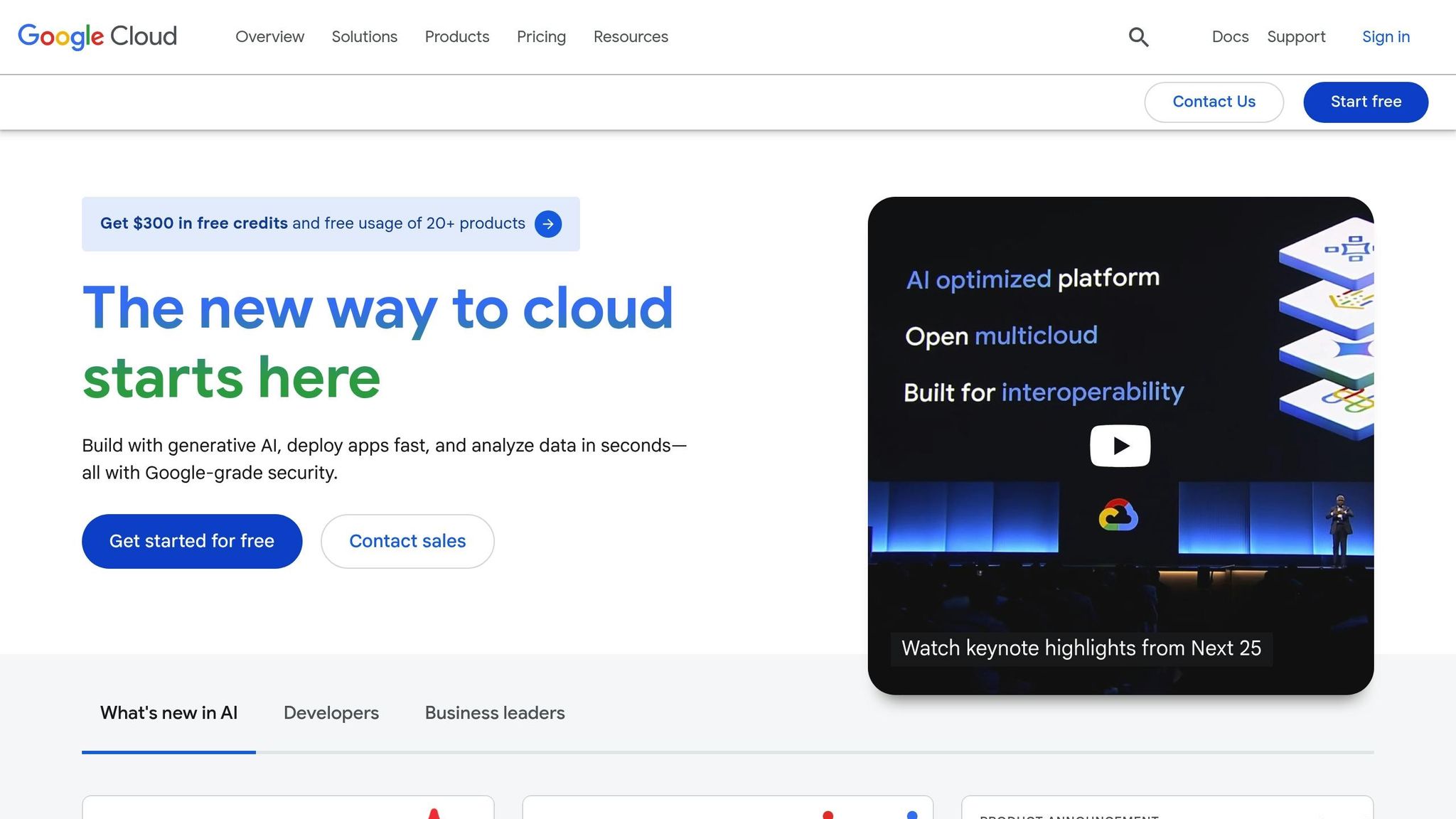
Google Cloud's AI-driven supply chain optimization tools aim to simplify operations, cutting down on waste, emissions, and costs. By leveraging analytics and machine learning, the platform provides real-time visibility across supply chains, enabling businesses to make smarter, faster decisions. This approach lays the groundwork for measurable environmental progress, as outlined below.
Sustainability Impact
Google Cloud’s supply chain solutions tackle environmental challenges by pinpointing inefficiencies. For example, predictive insights help reduce overproduction, while route optimization algorithms shorten transportation distances, cutting fuel use and carbon emissions. Businesses using these tools have reported up to a 30% drop in surplus inventory and a 15% boost in logistics efficiency. Research suggests that large enterprises adopting AI-powered supply chain tools can lower greenhouse gas emissions by as much as 10%, with even more potential for smaller, eco-focused startups.
The platform also automates sustainability data collection and analysis, helping businesses comply with frameworks like ESRS, SASB, CDP, and GRI. This is especially critical for US-based green startups, which must meet both federal and state standards while proving their commitment to environmental responsibility to investors and customers. These capabilities align with the operational and regulatory demands of green entrepreneurs in the US.
Key Features for Green Innovation
Google Cloud provides a suite of tools designed to support sustainable supply chain management. Features like real-time tracking and predictive analytics allow businesses to monitor materials and predict demand, reducing waste. A supplier scoring system ranks partners based on sustainability metrics, helping entrepreneurs choose eco-friendly collaborations.
Integration with Google services such as BigQuery and Looker enhances data analysis and visualization. This enables businesses to identify inefficiencies, uncover trends, and track progress toward sustainability targets. By analyzing extensive datasets, the platform aids in making smarter decisions around procurement, inventory, and logistics - helping reduce environmental impact while improving operational workflows.
Practical Applications for US-based Green Entrepreneurs
Green entrepreneurs in the US can use these tools to achieve both environmental and financial goals. For example, the platform allows businesses to map their supply chains, pinpoint weak spots, and set actionable sustainability objectives. A renewable energy startup might leverage predictive insights to anticipate demand, avoiding overproduction and cutting waste and emissions.
A standout example is Unilever, which in 2023 used Google Cloud's supply chain AI to cut inventory waste by 20% and improve demand forecasting accuracy by 15%. By integrating with Google BigQuery, Unilever accessed real-time analytics that delivered cost savings and reduced carbon emissions. Marc Engel, Unilever's Chief Supply Chain Officer, highlighted these achievements. Similarly, US-based green businesses can use route optimization to lower fuel usage, demand forecasting to curb overproduction, and supplier analysis to prioritize sustainable partnerships - all while improving Scope 3 emissions reporting to meet regulatory requirements.
Cost-effectiveness
Google Cloud’s pay-as-you-go pricing model makes its supply chain solutions accessible to startups and small businesses without requiring significant upfront investment. By eliminating the need for costly on-premise infrastructure, the platform reduces operational overhead, offering a budget-friendly entry point for smaller companies. Businesses can scale their usage as they grow, making it a flexible option for startups.
Additionally, automated data integration streamlines supplier information management in minutes, cutting down on errors and reducing the need for extra staff. This efficiency is especially useful for green startups aiming to simplify complex sustainability reporting while managing tight budgets. The platform’s pricing and automation features make it an attractive choice for eco-conscious businesses looking to scale responsibly.
3. Google DeepMind (Energy Usage Reduction)
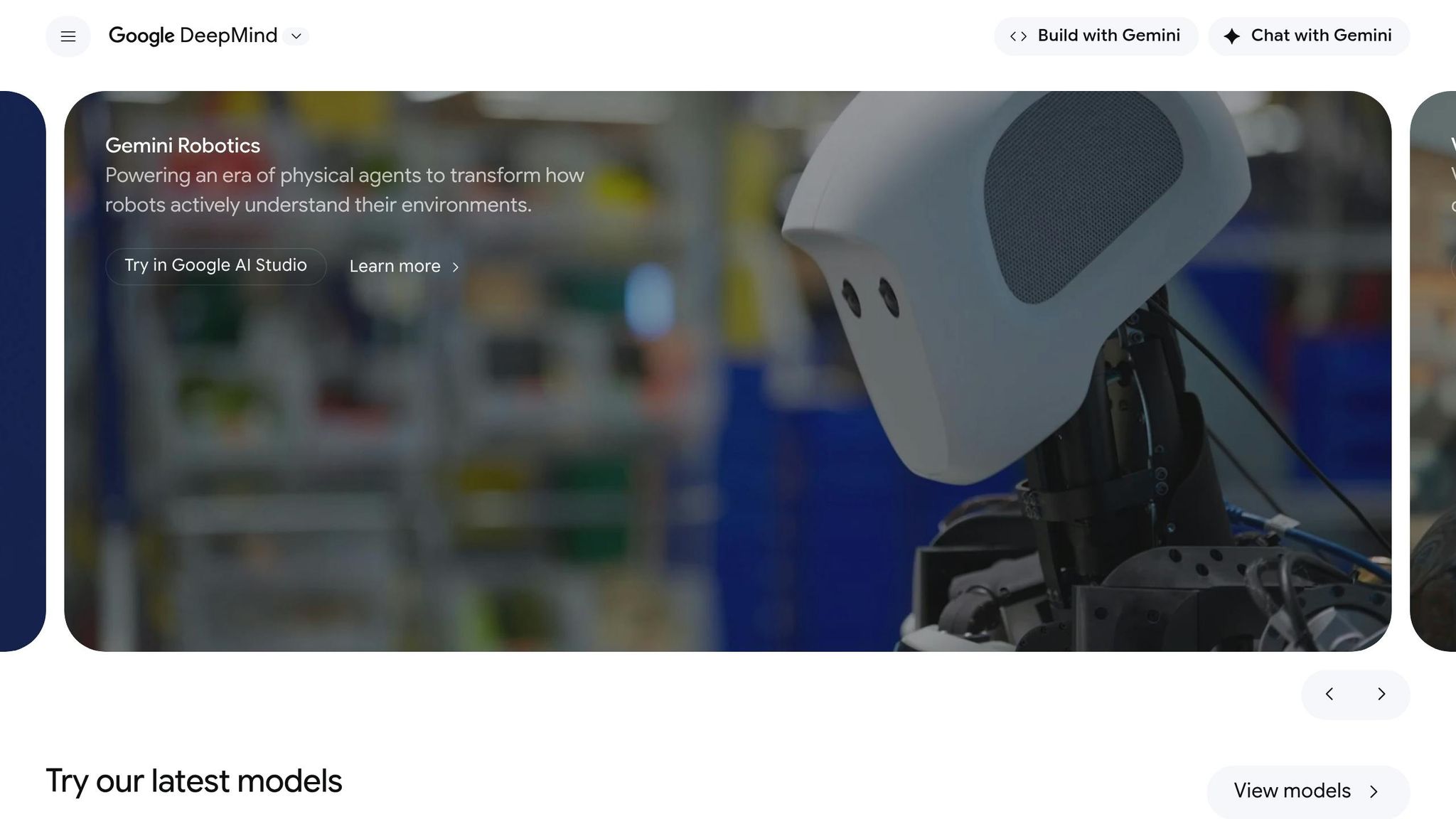
Google DeepMind is making waves in energy management by leveraging AI to cut down on energy use. Its advanced system analyzes real-time data and dynamically adjusts cooling and power systems, improving efficiency while aligning with sustainability goals. This approach not only optimizes internal operations but also complements broader environmental initiatives discussed in this article.
Sustainability Impact
DeepMind's AI system has shown tangible environmental benefits through smarter energy management. Using deep reinforcement learning, it processes thousands of variables in real time to reduce energy waste. A standout example is its application in Google's data centers, where it slashed cooling energy use by up to 40%, leading to a 15% overall drop in energy consumption. These ongoing improvements help businesses cut greenhouse gas emissions, lower utility bills, and meet stricter environmental regulations.
Key Features for Green Innovation
DeepMind's platform comes packed with features designed to support energy-conscious businesses:
- Real-time monitoring: Tracks energy usage continuously, offering instant insights into consumption patterns.
- Predictive analytics: Uses historical data, weather trends, and schedules to forecast energy needs and make proactive adjustments.
- Automated control systems: Automatically fine-tunes power and cooling settings, reducing human error and maximizing efficiency.
- Seamless integration: Works with existing building systems and provides detailed reports to monitor progress toward sustainability goals.
Practical Applications for US-based Green Entrepreneurs
For green entrepreneurs in the US, integrating DeepMind's AI starts with an energy audit, followed by installing sensors and deploying AI for real-time optimization.
Take manufacturing facilities, for example - they can streamline energy use by fine-tuning production equipment and climate control systems. Similarly, commercial real estate operations can implement intelligent HVAC systems that adjust heating and cooling based on occupancy and weather. These strategies do more than just cut energy costs; they also help businesses meet regulatory requirements and cater to customers who prioritize environmental responsibility.
Cost-effectiveness
While the initial setup involves costs for hardware, integration, and consulting, the energy savings and available incentives often lead to a return on investment within the first year. Beyond cutting energy bills, businesses benefit from reduced wear and tear on equipment, lowering maintenance expenses and extending asset lifespans. Federal and state programs, like energy efficiency grants and tax credits, further offset upfront costs. With its scalable and cost-efficient approach, DeepMind's technology is a practical choice for green entrepreneurs looking to embrace sustainable innovation.
4. Honeywell (Safety and Compliance)
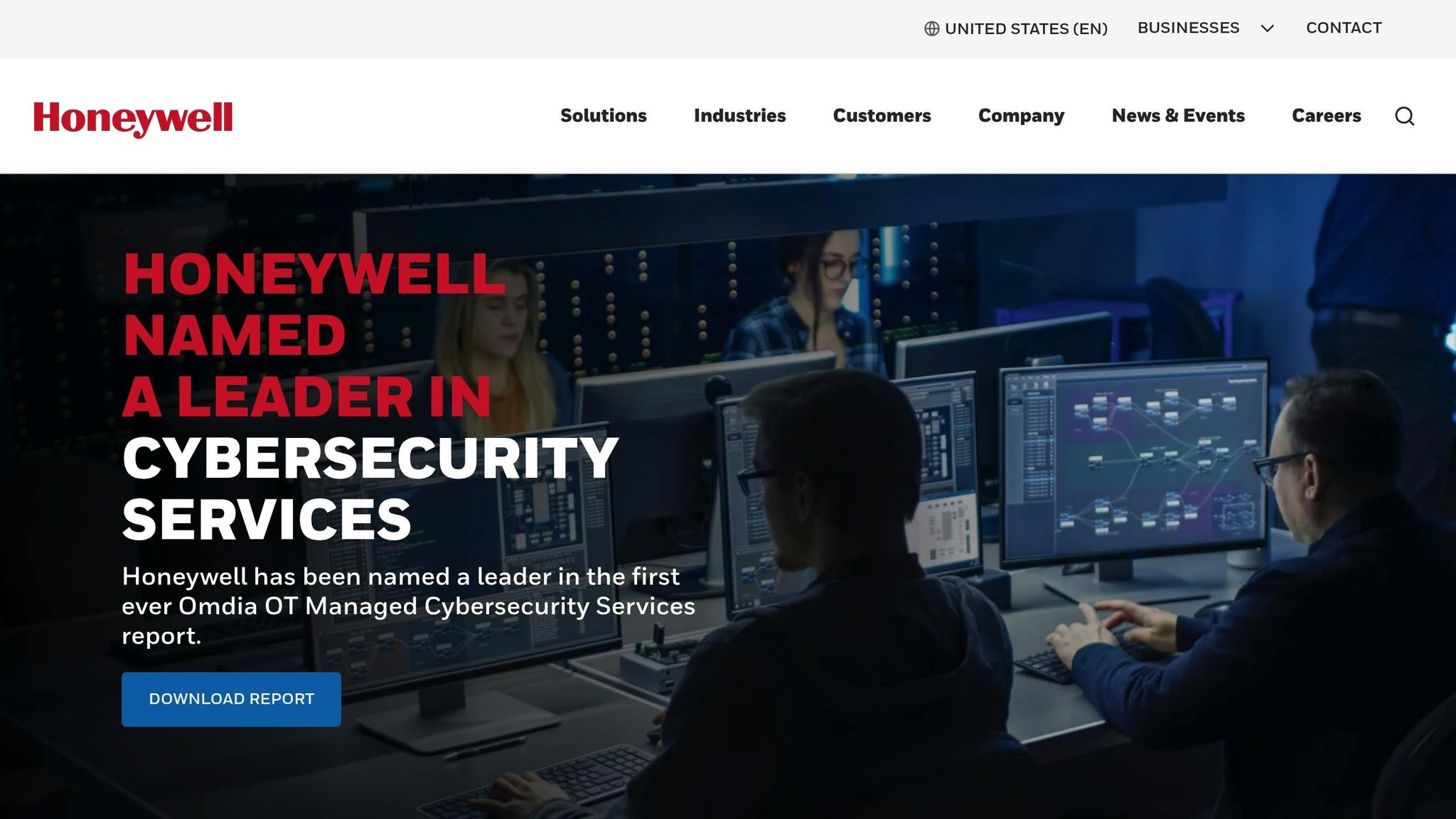
Honeywell's AI-driven safety and compliance platform provides a practical solution for green entrepreneurs striving to meet environmental goals while navigating strict regulatory demands. By combining artificial intelligence with IoT sensors, the system automates workplace condition monitoring, tracks environmental metrics, and generates real-time compliance reports. This ensures businesses can maintain both safety and sustainability standards. Let’s explore how Honeywell's platform achieves measurable progress in energy use and workplace safety.
Sustainability Impact
Honeywell’s technology makes a noticeable difference in reducing environmental impact through smart facility management and automated oversight. Its Forge Energy Optimization platform uses machine learning to fine-tune heating, cooling, and lighting systems based on real-time building data, cutting energy consumption by up to 25% in commercial properties. Predictive maintenance further minimizes waste by addressing potential equipment failures before they occur, reducing the need for emergency repairs that often carry a heavier environmental toll.
Key Features for Green Innovation
This platform is designed to boost operational efficiency while aligning with eco-conscious business strategies. Key features include:
- Real-time monitoring: Tracks air quality, energy usage, and emissions continuously, with alerts triggered when thresholds are exceeded.
- Automated compliance documentation: Generates reports that meet EPA and OSHA standards, eliminating manual paperwork and lowering the risk of regulatory issues.
- Predictive analytics: Uses data on trends, weather, and occupancy to proactively adjust energy needs, ensuring optimal efficiency.
These features not only streamline operations but also support broader sustainability goals.
Practical Applications for US-based Green Entrepreneurs
Honeywell’s platform isn’t just theoretical - it’s making a tangible difference for businesses. For example, in April 2024, Honeywell partnered with a major US logistics company to roll out its AI system across 12 distribution centers. Under Operations Director Mark Evans, the initiative reduced energy consumption by 22%, cut safety incidents by 15%, and saved over 120 hours per month in manual compliance reporting - all within four months.
Solar energy companies also rely on Honeywell’s monitoring systems to track equipment performance and quickly identify issues affecting energy output. Green manufacturing startups have reported spending 40% less time on regulatory paperwork thanks to compliance automation, while eco-friendly building operators have seen indoor air quality improve by as much as 30%.
Cost-effectiveness
Though an initial investment of approximately $5,000 per year is required for small businesses, Honeywell’s solutions often pay for themselves within one to three years. Savings come from reduced regulatory fines, lower insurance premiums, and operational efficiencies like improved energy use. A 2023 case study highlighted a US manufacturing facility that reduced workplace incidents by 18% and compliance reporting time by 40% in just six months. The platform’s scalability allows businesses to start with basic monitoring and gradually add advanced features, providing flexibility as they grow.
5. Bosch (Production Quality Control)
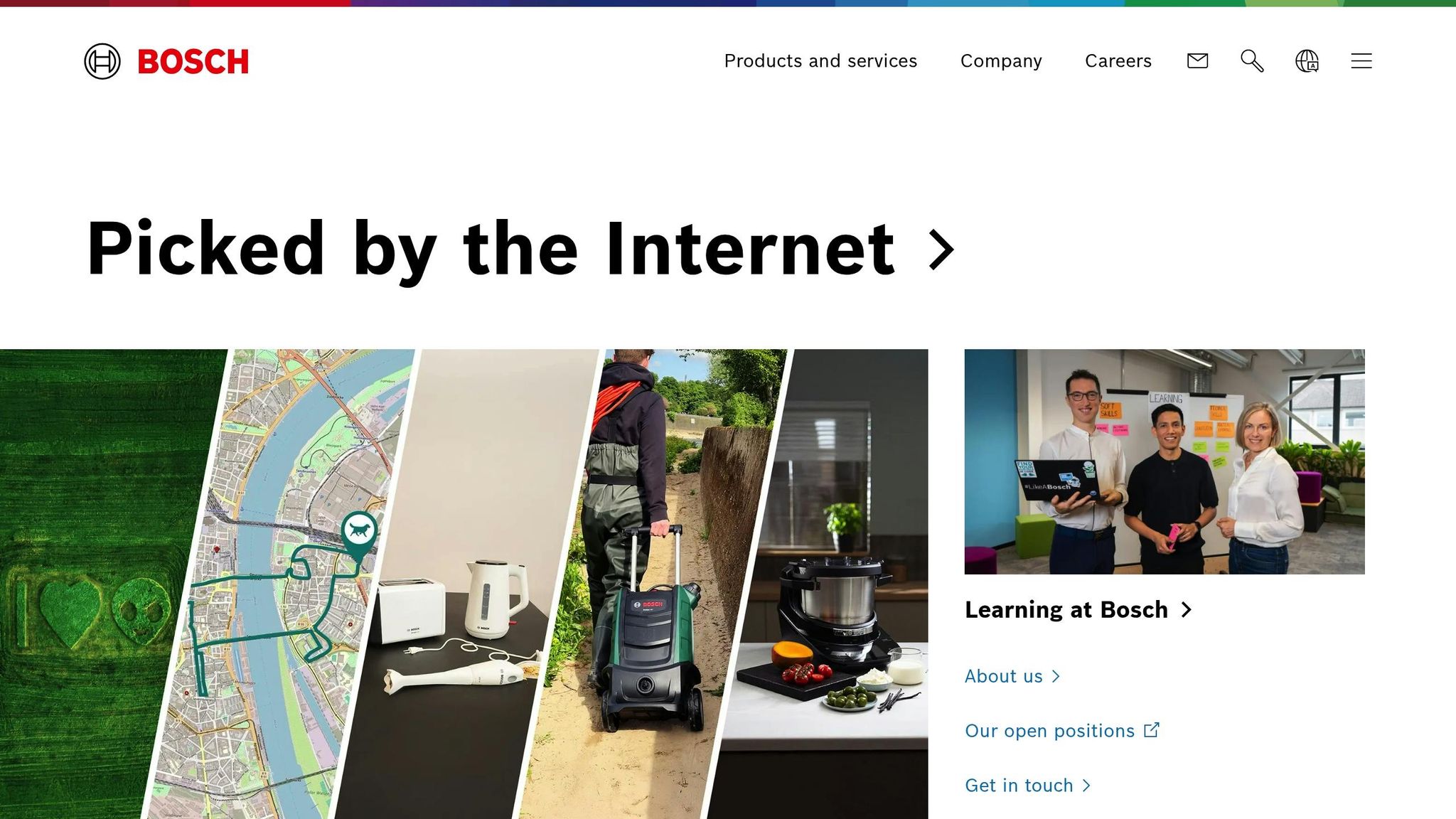
Bosch has developed AI-powered production quality control systems that help green-focused businesses reduce waste and maintain high-quality standards. By combining machine learning with IoT sensors, these tools detect defects instantly and optimize resource usage. This smart monitoring approach leads to measurable improvements in sustainability.
Sustainability Impact
Bosch's AI-driven quality control system is making a tangible difference in reducing waste and conserving energy. Its real-time defect detection ensures that faulty products are stopped early in the production process, saving the resources that would otherwise go into defective items. In pilot projects across the United States, Bosch's system has achieved up to 20% energy savings and a 15% reduction in material waste.
Key Features for Green Innovation
Bosch’s platform includes several AI-powered features tailored for sustainable manufacturing:
- Real-time defect detection: Using computer vision and machine learning, the system identifies quality issues immediately, enabling quick corrective actions.
- Automated data collection: This simplifies compliance reporting and provides detailed insights into resource use, helping manufacturers track and optimize their operations.
- Predictive analytics: By analyzing sensor data, the system forecasts maintenance needs, preventing unexpected equipment failures that could lead to wasted materials and energy.
- Process optimization: Algorithms continuously assess production processes to uncover opportunities for cutting energy use and reducing material waste.
Together, these features create a robust framework that supports both environmental goals and operational efficiency.
Practical Applications for US-based Green Entrepreneurs
Bosch's system is designed to integrate smoothly into various manufacturing settings. For example, in June 2024, Bosch collaborated with Ford Motor Company at its Michigan plant to implement AI-driven quality control for engine assembly. Under the leadership of Ford's Manufacturing Director Lisa Grant, the project achieved a 17% drop in defective units and a 12% reduction in energy consumption within six months. This initiative also helped Ford meet its 2024 sustainability targets.
Other U.S. manufacturers have seen similar success. Automotive and electronics companies report better product quality and reduced waste after adopting Bosch's solutions. Solar panel manufacturers use the system to minimize silicon waste, while green building material companies rely on its predictive maintenance features to avoid downtime and improve energy efficiency.
The system’s compatibility with both metric and imperial units ensures smooth adoption in U.S. facilities. Additionally, its cloud-based monitoring allows manufacturers to oversee operations across multiple locations remotely.
Cost-effectiveness
While Bosch’s solutions require an upfront investment - starting at $10,000 for entry-level setups and exceeding $100,000 for enterprise-scale deployments - they deliver long-term savings. Companies can reduce unplanned downtime by up to 25% and cut maintenance costs by as much as 30%, often recouping their investment within 18–24 months.
The system’s scalability makes it ideal for green entrepreneurs. Businesses can start with small-scale pilot projects to evaluate energy and resource savings before committing to full-scale deployment. This phased approach minimizes financial risk and provides clear data on ROI, enabling entrepreneurs to reinvest their savings into additional sustainability efforts.
6. BrainBox AI (Air Quality Monitoring)
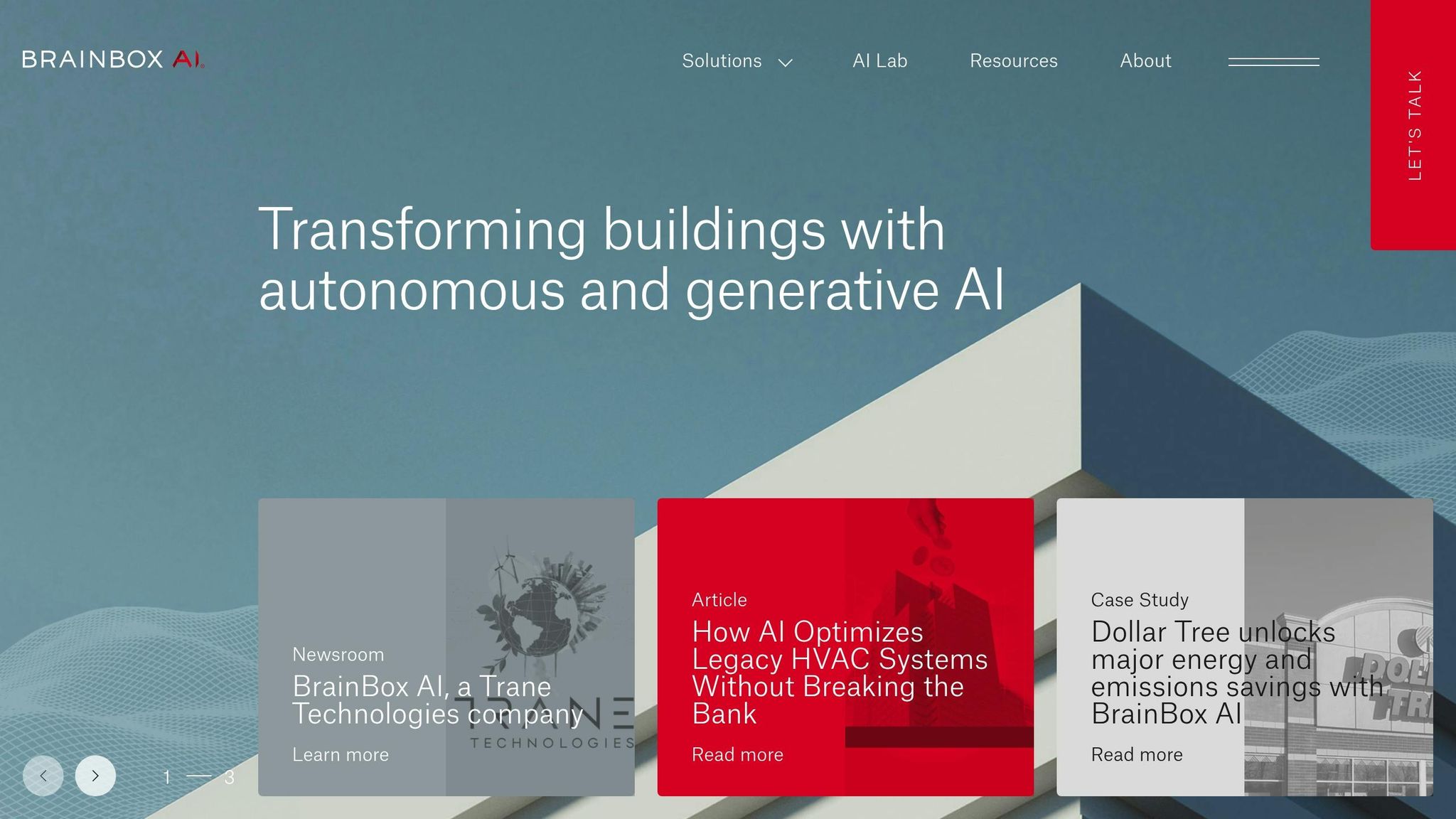
BrainBox AI is making waves in the world of air quality management, offering a smart solution for businesses focused on sustainability. This cloud-based platform uses deep learning to monitor building performance in real time, automatically adjusting heating, ventilation, and air conditioning (HVAC) systems. The result? Healthier indoor air quality and lower energy consumption. For businesses aiming to balance environmental responsibility with cost efficiency, BrainBox AI delivers tangible benefits. Let’s dive into its impact, features, applications, and cost-effectiveness for green entrepreneurs in the U.S.
Sustainability Impact
BrainBox AI delivers impressive results. It can reduce HVAC energy costs by up to 25%, cut a building's carbon footprint by as much as 40%, and improve indoor air quality by up to 60% within the first year. These improvements not only lower greenhouse gas emissions but also ease the burden on electrical grids. Additionally, its predictive technology helps businesses avoid air quality violations, ensuring compliance with EPA standards - especially critical in areas with strict regulations.
Key Features for Green Innovation
BrainBox AI comes packed with features designed to support sustainability efforts:
- Automated alerts: Immediate notifications when air quality levels exceed set thresholds.
- Historical analysis: Insights into seasonal trends and pollution patterns.
- Predictive modeling: Anticipates future air quality changes based on factors like weather, building occupancy, and schedules.
- Seamless integration: Works effortlessly with existing building management systems and IoT networks.
The platform also allows businesses to export data to sustainability dashboards, enabling more coordinated environmental management.
Practical Applications for U.S.-based Green Entrepreneurs
BrainBox AI is versatile, serving industries like manufacturing, agriculture, logistics, and commercial real estate. A standout example is its implementation by CBRE Group in September 2024. Spanning 2.5 million square feet of office space in New York City, the project - spearheaded by Facilities Director Mark Evans - achieved a 22% reduction in energy costs and a 45% boost in air quality metrics within six months. This initiative also supported CBRE’s LEED certification renewal. For businesses in states like California, where air quality regulations are stringent, BrainBox AI simplifies compliance reporting, making regulatory processes far less daunting.
Cost-effectiveness
BrainBox AI operates on a subscription model, with prices typically ranging from $0.10 to $0.25 per square foot per month for mid-sized commercial buildings in the U.S.. While there may be initial setup fees, many businesses see a return on investment within 12 to 18 months, thanks to significant energy savings. The platform’s scalability is evident in its deployment across more than 100 million square feet of commercial real estate worldwide. Most buildings achieve 20–25% reductions in energy costs within the first year. By automating air quality monitoring, businesses can save on manual inspections, cut consulting expenses, and avoid costly regulatory fines. For startups and small green businesses looking to grow sustainably, BrainBox AI offers a practical, results-driven solution with measurable gains in just a few months.
sbb-itb-6487feb
7. PepsiCo (Smart Agriculture)

PepsiCo is at the forefront of using AI to revolutionize agriculture, reshaping how crops are grown around the world. Through its Sustainable Farming Program (SFP), the company integrates artificial intelligence with farming techniques to help farmers use resources more efficiently, increase crop yields, and minimize environmental harm. By combining precision agriculture tools with advanced data analytics, PepsiCo is not only improving farm productivity but also promoting sustainable practices that align with the goals of eco-conscious entrepreneurs in the US.
Sustainability Impact
PepsiCo's AI-based farming initiatives have delivered impressive results in sustainability. As of 2023, the company sources 87% of its agricultural ingredients sustainably and is on track to achieve 100% by 2030. Its regenerative agriculture efforts now cover over 900,000 acres globally, with an ambitious goal of expanding to 7 million acres by 2030. In India, an AI-powered irrigation scheduling project for potato farmers led to a 30% reduction in water usage, showcasing the practical benefits of these technologies.
Key Features for Green Innovation
PepsiCo's smart agriculture platform is packed with cutting-edge features designed to enhance both sustainability and efficiency:
- Real-time soil monitoring: Sensors and satellite imagery provide continuous updates on soil health.
- Predictive analytics: AI uses weather forecasts and historical data to guide crop management decisions.
- Automated irrigation systems: Water delivery is adjusted to meet actual crop needs, avoiding waste.
- AI-driven recommendations: Tailored advice on fertilizer, water, and pesticide use to optimize inputs.
- Remote sensing and data collection: Reduces the need for physical field visits while ensuring constant monitoring of crop conditions.
Practical Applications for US-based Green Entrepreneurs
PepsiCo's global success in smart agriculture translates into tangible opportunities for American farmers and green entrepreneurs. For instance, in states like Iowa and Nebraska, the company has partnered with farmers to deploy AI-powered soil and crop monitoring systems, creating scalable models for sustainable farming in the Midwest. A standout example is PepsiCo's 2022 collaboration with Microsoft, which introduced AI-driven tools to monitor soil moisture and crop health. This initiative achieved a 30% reduction in water usage and a 15% increase in yield over a single growing season for potato farmers in both the US and India. Additionally, PepsiCo provides training and digital tools to help farmers, including small-scale producers, embrace these AI-powered practices.
Cost-effectiveness
The financial benefits of PepsiCo's AI-driven solutions are hard to ignore. Pilot programs have shown that optimizing inputs with AI can cut costs by 10–20% while increasing yields by 5–15%. For US businesses, these technologies align with growing consumer demand for sustainably produced food, opening doors to premium markets. Moreover, AI tools help farmers comply with US environmental regulations, such as the Clean Water Act and state-level nutrient management rules, reducing the risk of expensive penalties. This combination of cost savings, operational efficiency, and regulatory support makes PepsiCo's smart agriculture solutions a compelling choice for entrepreneurs aiming to scale their sustainable farming efforts.
8. Amazon (Sustainability Data Analysis)
Amazon Web Services (AWS) provides cloud-based tools designed to help businesses manage and act on environmental data. These tools allow green entrepreneurs to monitor carbon emissions, track energy usage, and streamline supply chains. With built-in machine learning, AWS identifies patterns in environmental data, enabling smarter decisions that balance sustainability goals with profitability.
Sustainability Impact
AWS's sustainability tools have shown measurable results across various industries. By processing vast amounts of data, companies have been able to cut energy use by optimizing workloads and spotting inefficiencies in real time. Additionally, AWS's generative AI offers accurate carbon footprint calculations by analyzing transportation, energy consumption, and other operational data - at a fraction of the cost of traditional methods.
Key Features for Green Innovation
The AWS toolkit includes real-time data collection powered by IoT, predictive machine learning models, and automated reporting tools that transform raw data into audit-ready formats. These features integrate seamlessly with established sustainability frameworks. AWS's AI also enhances supply chain efficiency by identifying problem areas, reducing fuel use, and cutting emissions. These tools help businesses implement practical sustainability strategies in their day-to-day operations.
Practical Applications for US-based Green Entrepreneurs
For entrepreneurs in the US, AWS's tools offer a range of benefits. Real-time energy monitoring allows businesses to track usage patterns accurately, while automated carbon footprint calculations eliminate the need for manual data entry. The platform also simplifies compliance by generating reports aligned with US environmental regulations, easing administrative workloads. For example, a food distributor used AWS to improve cold chain logistics by analyzing real-time temperature and route data, which reduced both food waste and energy consumption. Similarly, solar energy startups and eco-friendly retailers can use AWS IoT and analytics to monitor solar panel performance and assess supply chain emissions. This even extends to identifying Scope 3 risks using publicly available data.
Cost-effectiveness
AWS's pay-as-you-go pricing model makes its sustainability tools accessible to startups and small businesses without requiring hefty upfront investments. By relying on a cloud-based infrastructure, businesses avoid the expense of purchasing hardware and benefit from scalable solutions. Automation further reduces costs by minimizing the labor involved in sustainability reporting and compliance. According to research by PwC, generative AI can improve operational efficiency while indirectly lowering carbon footprints in business processes. AWS, like other AI-powered platforms, provides scalable and budget-friendly solutions that deliver both environmental and operational advantages.
9. Mortar IO (Carbon Footprint Planning)
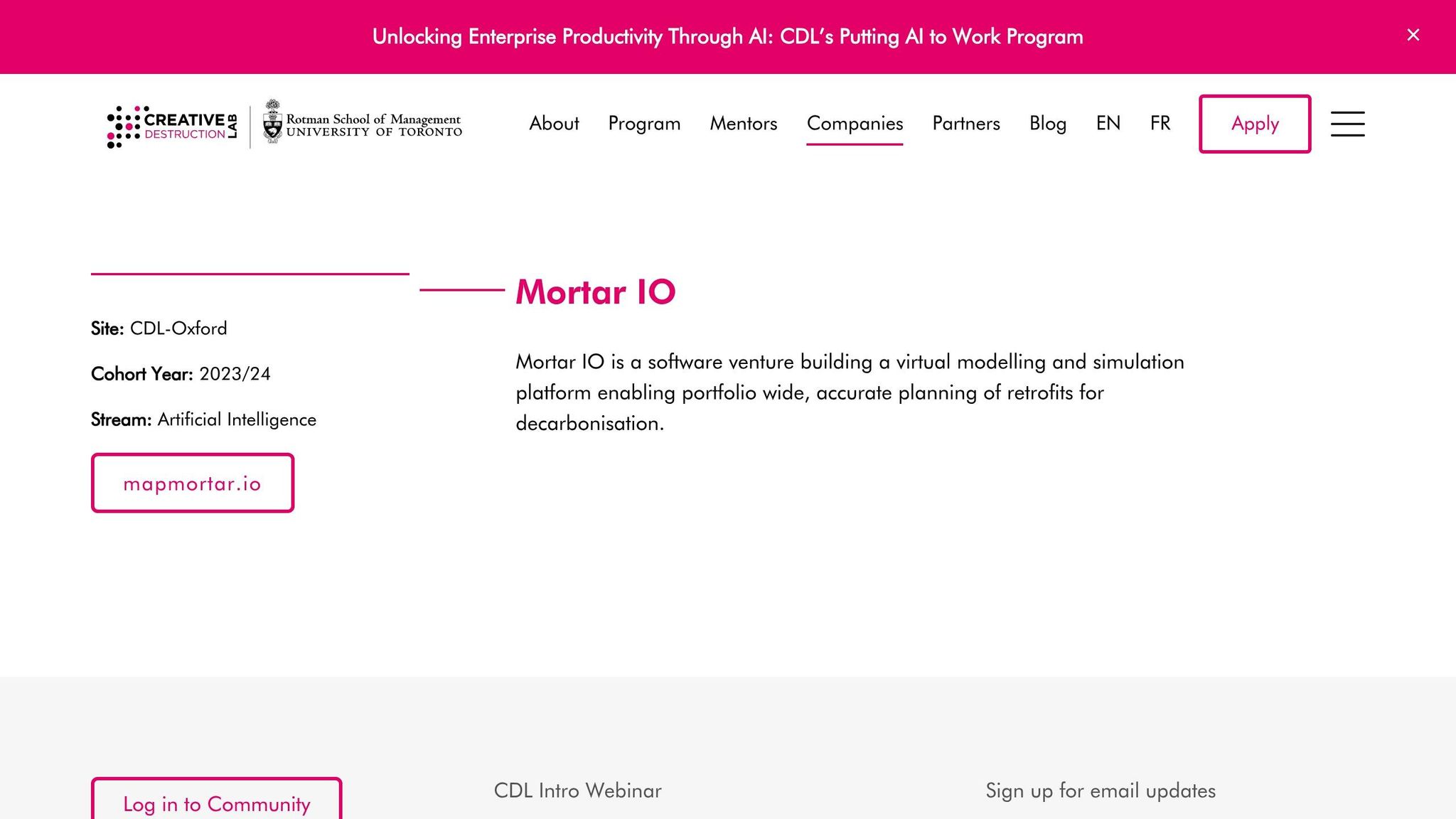
Mortar IO is an AI-driven platform designed to help eco-conscious entrepreneurs measure, analyze, and reduce their carbon footprint. By automating data collection and offering real-time analytics, it pinpoints areas where emissions can be cut and tracks progress toward sustainability goals. Its focus on carbon accounting and emissions management makes it a valuable tool for businesses integrating sustainability into their core operations.
Sustainability Impact
Mortar IO calculates greenhouse gas emissions and sets reduction targets based on scientific guidelines. It provides clear, actionable data to ensure compliance and monitor progress. By automating carbon accounting, the platform enables businesses to contribute more effectively to global climate efforts, including meeting net-zero commitments that are quickly becoming standard across industries.
Platforms like Mortar IO can cut carbon reporting time by up to 50% and boost data accuracy by 30% compared to manual methods. This added efficiency means businesses can allocate more resources to reducing emissions rather than getting bogged down in administrative tasks, amplifying their environmental impact.
Key Features for Green Innovation
Mortar IO’s standout feature is its automated carbon accounting system, which integrates seamlessly with business software, IoT devices, and supply chain systems. This allows businesses to track energy use, transportation, procurement, and waste, offering a complete view of their carbon footprint. The platform also includes a scenario modeling tool, enabling entrepreneurs to evaluate the impact of operational changes before implementing them, ensuring smarter sustainability investments.
Customizable dashboards provide real-time insights into emissions trends, while benchmarking tools help businesses measure their sustainability efforts against industry standards. The platform also generates compliance-ready reports that meet both US and international standards, ensuring accurate and reliable carbon accounting for diverse operations. These features not only simplify the carbon tracking process but also empower entrepreneurs to develop targeted strategies for sustainability.
Practical Applications for US-based Green Entrepreneurs
For entrepreneurs in the US, Mortar IO offers tailored tools to track emissions from energy use, transportation, and supply chains, with the flexibility to use metric or imperial units. Its reporting capabilities align with US regulatory requirements, such as EPA guidelines and the SEC's emerging climate disclosure rules, which many businesses are now required to follow.
The platform also identifies cost-saving opportunities by analyzing energy efficiency and waste reduction. For instance, businesses can use the insights to highlight their sustainability achievements to investors and customers. This is especially useful for securing green financing or attracting environmentally conscious consumers in the US.
To ease adoption, Mortar IO provides onboarding assistance and detailed US-specific documentation. Entrepreneurs can start with small-scale projects to familiarize themselves with the platform before expanding their carbon management initiatives.
Cost-effectiveness
Mortar IO offers tiered pricing, ranging from $99 to $499 per month, based on company size and data needs. By automating data collection and reporting, it reduces reliance on costly external consultants.
The platform’s insights help businesses cut operational costs by identifying inefficiencies and optimizing resource use. With nearly $2 trillion in investments flowing into green industries in the US, tools like Mortar IO are essential for entrepreneurs looking to seize sustainability opportunities while managing expenses. Its automated reporting also positions businesses to meet ESG requirements, which are increasingly necessary to secure investment and government incentives in the US market.
10. Eugenie.ai (Industrial Emissions Tracking)

Eugenie.ai, a tool designed for tracking industrial emissions using AI, is currently on hold. For now, green entrepreneurs will need to either wait for its return or explore other available options. While many platforms continue to assist in sustainable practices, Eugenie.ai's pause serves as a reminder of how quickly the innovation landscape can shift. Check out the comparison chart below for other AI tools that can help drive eco-friendly initiatives.
Tool Comparison Chart
When selecting the best AI tool for your green business, it’s essential to weigh how each platform measures up in terms of sustainability, features, pricing, and limitations. Here’s a breakdown to help you make an informed decision:
| Tool | Sustainability Impact | Main Features | Pricing Model | Key Limitations |
|---|---|---|---|---|
| JobLogr | Improves career efficiency for green talent acquisition | AI-powered resume building, job search automation, interview prep, application tracking | Free tier available; Premium at $20/month with a 7-day trial | Not tailored to sustainability; focuses on hiring rather than operations |
| Google Cloud | Reduces supply chain emissions and optimizes operations | Data analytics, supply chain optimization, predictive modeling | Pay-as-you-go with a free tier; custom enterprise pricing | Requires advanced technical expertise for setup |
| Google DeepMind | Cuts energy consumption by up to 40% in data centers | AI optimization algorithms, energy analytics, automated systems | Custom enterprise pricing only | Geared toward large-scale operations; high entry barrier |
| Honeywell | Enhances safety compliance and boosts energy efficiency | IoT automation, compliance tracking, safety monitoring, regulatory reporting | Custom enterprise quotes based on scale | Industry-specific focus; complex integration process |
| Bosch | Improves production quality and reduces material waste | IoT sensors, predictive maintenance, quality control automation | Custom enterprise pricing with hardware costs | Requires hardware integration; focuses on manufacturing |
| BrainBox AI | Optimizes building energy use and air quality | Real-time HVAC optimization, energy monitoring, automated climate control | Custom pricing based on building size and complexity | Designed for commercial buildings; needs hardware installation |
| PepsiCo Smart Agriculture | Optimizes water and fertilizer use in farming | AI crop monitoring, yield prediction, resource optimization | Not publicly available (internal PepsiCo tool) | Not accessible to external businesses |
| Amazon Web Services | Tracks sustainability data and carbon emissions | Cloud analytics, carbon footprint tracking, environmental KPI dashboards | Pay-as-you-go model with free tier options | Data privacy concerns; requires technical setup |
| Mortar IO | Helps with carbon footprint planning and emissions modeling | Emissions tracking, carbon planning tools, sustainability reporting | Custom enterprise pricing | Early-stage platform with limited adoption |
| Eugenie.ai | Monitors and tracks industrial emissions | AI-powered emissions monitoring, automated regulatory reporting | Custom enterprise pricing | Currently on hold; focuses solely on heavy industry |
Analysis for Green Entrepreneurs
For smaller green businesses, JobLogr is the most budget-friendly option, offering a manageable $20/month premium plan. It’s ideal for those prioritizing talent acquisition with a sustainability lens.
If your goal is making a measurable environmental impact, Google Cloud and Amazon Web Services stand out with flexible pay-as-you-go pricing and tools that support emissions tracking and data analysis. These platforms are more accessible to businesses without the need for heavy hardware investments.
On the other hand, enterprise-level tools like Honeywell, Bosch, and BrainBox AI provide advanced sustainability solutions but come with higher costs and require significant technical expertise or upfront investments. These tools are better suited for organizations with the resources to handle complex integrations.
For those seeking tools with a direct environmental focus, expect to pay more and navigate more complicated setups. However, these platforms often provide detailed analytics and reliable support, making them valuable for scaling operations efficiently while aligning with sustainability goals.
Conclusion
As highlighted in the case studies above, AI is proving to be a game-changer for green entrepreneurs across the United States, making environmentally friendly practices both achievable and profitable. By automating tasks like data collection and emissions tracking, AI allows business owners to concentrate on creating meaningful environmental change.
The evidence is compelling. For instance, Next Gen's plant-based food startup uses AI to develop chicken alternatives that use 74% less land, 82% less water, and emit 88% fewer greenhouse gases compared to traditional chicken farming. These kinds of measurable results show how AI can directly contribute to reducing environmental impacts.
AI is also leveling the playing field for small, mission-driven businesses. With tools like Google Cloud for supply chain optimization, emissions tracking platforms, and resources like JobLogr to build sustainable teams, even smaller companies can operate with the efficiency of much larger organizations. This accessibility empowers entrepreneurs to compete in markets that were once out of reach.
On top of that, the U.S. government’s nearly $2 trillion investment in alternative energy and climate technology is creating a fertile ground for innovation. Green entrepreneurs who adopt AI tools are not only better equipped to meet evolving regulations but can also take advantage of government incentives designed to promote sustainability. These tools provide the kind of data-driven insights that make it easier to balance profitability with environmental responsibility.
For green entrepreneurs looking to scale, AI offers a clear path forward. By simplifying workflows, cutting costs, and enhancing sustainability efforts, these tools are helping businesses achieve their goals while staying committed to a greener future. AI isn’t just a technological upgrade - it’s a catalyst for meaningful change.
FAQs
How can AI tools support green entrepreneurs in meeting U.S. sustainability regulations?
AI tools are proving to be a game-changer for green entrepreneurs trying to navigate the maze of U.S. sustainability regulations. They simplify complicated processes, break down regulatory requirements, and even provide actionable insights to help businesses stay on track. From analyzing compliance metrics to generating detailed reports, these tools ensure companies align with environmental standards without getting bogged down in red tape.
Beyond compliance, AI platforms can pinpoint opportunities to improve energy efficiency, cut down on waste, and monitor emissions more effectively. This allows entrepreneurs to not only meet legal requirements but also innovate in ways that make their operations cleaner and more efficient. The result? Green businesses can save time, cut costs, and dedicate more energy to developing sustainable solutions.
What costs should small businesses consider when adopting AI tools for sustainability?
The price tag for adopting AI solutions aimed at sustainability can differ greatly based on the tools and services you opt for. If you're a small business, it's essential to weigh a few critical factors: initial setup expenses, subscription costs, and ongoing maintenance or updates. On top of that, you might need to budget for staff training or even bring in experts to ensure these tools deliver their full potential.
To get the best value from your investment, prioritize tools that directly support your sustainability objectives - whether that's cutting down on energy use, streamlining supply chains, or reducing waste. Many AI platforms come with flexible pricing options, so you can start with a smaller plan and scale up as your needs evolve. Take time to assess the potential return on investment (ROI) to confirm that the long-term benefits will outweigh the upfront and ongoing costs.
How can AI tools like Google Cloud and AWS help green entrepreneurs improve supply chain efficiency while benefiting the environment?
AI platforms like Google Cloud and AWS are empowering eco-conscious entrepreneurs to refine their supply chains by analyzing massive datasets. These tools use sophisticated algorithms to pinpoint inefficiencies, predict demand, optimize inventory, and streamline logistics. The result? Lower energy use and reduced emissions.
With AI-driven insights, businesses can make smarter, greener choices - like choosing environmentally responsible suppliers or designing delivery routes that cut down on fuel consumption. These tools don’t just boost operational efficiency; they also help entrepreneurs align their operations with sustainability goals.